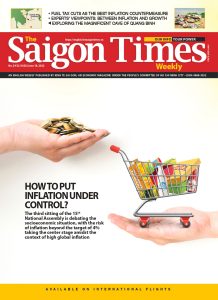While the requirement for upgrading the local stock market’s status from frontier to emerging could spur the market’s growth in the long term, many investors are awaiting the State divestment wave and consider it a short-term supporting factor. Meanwhile, many large firms with positive business results may sell shares this year.
Hovering around 1,300 points
After a recovery in the second half of May, the stock market’s growth stagnated in the first days of June, with the VN-Index hovering around the resistance level of 1,300 points.
In a newly-released report on the market strategy in June, the SSI Securities Corporation stated that at present, there is no motivation for the strong growth of the benchmark index. The 1,280-point zone will decide the trend of the VN-Index this month. If the index stays above this zone, it may expand its technical recovery momentum to 1,300-1,330 points. On the contrary, if the VN-Index falls below 1,280 points, it is likely to reach the nearest support zone of 1,261-1,250 points.
Regardless of the risk of corrections in the coming periods, especially when the interest rates are increasing fast and the State Bank of Vietnam may revise up key interest rate to help tame inflation, analysts have still assessed the market as positive in the second half of the year. This is due to the underway 2% interest rate aid package and the public investment disbursement acceleration.
Moreover, foreign investors’ net buying has supported the market. According to SSI’s report, foreign investors’ move has fueled the market’s recovery. In May, the exchange-traded fund, which was net injected into the market, amounted to nearly VND4.9 trillion, raising the consolidated fund since early this year to VND6.7 trillion. In addition, funds have net poured VND272 billion into the market.
In the long term, many investors are still confident of an upward trend due to the Vietnamese market’s status upgrading prospect. With the handling of recent violations in the stock market, policymakers and regulators have expected the early upgrading of the local stock market’s status.
During Prime Minister Pham Minh Chinh’s working trip to the United States last month, the New York Stock Exchange announced its cooperation with the State Securities Commission to help upgrade the Vietnamese market’s status and develop policies to facilitate investors to participate in the two stock exchanges.
Furthermore, the KRX system, a new information technology system meeting the international standards of the stock market and one of the factors serving the upgrade of the market’s status, will be piloted and put into operation in the near future.
More recently, at the fourth Vietnam Economic Forum, economists also proposed deploying solutions to upgrade the local stock market’s status, focusing on diversify products through the equitization of enterprises and enhance transparency in the management and governance of enterprises.
S&P Global Ratings has upgraded Vietnam’s long-term sovereign credit rating to BB+ from the BB level, affirming that Vietnam’s economy is recovering steadily and forecasting the country’s gross domestic product will expand 6.9% this year and maintain a long-term growth trend at 6.5%-7% from 2023 onward. This information will support the market.
 Waiting for the divestment wave
Waiting for the divestment wave
In previous years, the State Capital Investment Corporation (SCIC) publicized a list of enterprises in which it would sell stakes in April or May. However, the information for this year is nowhere to be found.
Looking back to the past, the slow divestment in State-owned groups, corporations and companies over the past few years has resulted in the missing of many opportunities despite the stock market experiencing strong growth and an abundance of low-cost capital thanks to the relaxed monetary policies worldwide.
Many divestments by the State were successful as State stakes were transferred at much higher prices than the expected prices and the market or book prices. However, the number of successful transactions out of the total planned divestments remains modest.
Last year, the National Assembly assigned the Government to generate VND40 trillion from the equitization of State-owned enterprises (SOE). However, the revenue from equitization and divestment submitted to the enterprise arrangement and development support fund was only over VND1.4 trillion in 2021 or 2.5% of the target.
According to experts, the evaluation of SOEs has remained a thorny issue. The value of an SOE, especially its land, is often put at a level far below what is universally accepted, putting both buyers and sellers at risk, especially after some criminal cases relating to the equitization and divestment, specifically the appraisal of enterprises.
Under the prime minister’s Decision 360/QD-TTg approving a project to restructure SOEs, mainly business groups and corporations, in the 2021-2025 period, issued in March this year, VND248 trillion generated from the equitization and divestment of SOEs was expected to be submitted to the State budget.
These enterprises were required to assess and determine capital, land and brand resources.
Most recently, on May 27, the prime minister issued Dispatch 478/CD-TTg on the enhancement of the arrangement, equitization, divestment and restructuring of State-owned enterprises. Accordingly, the Government and the prime minister have issued multiple documents directing the enhancement of the arrangement, equitization, divestment and restructuring of SOEs. However, the job has yet to be done as well as expected. The prime minister asked the Ministry of Planning and Investment to quickly review and complete a plan to restructure SOEs in the 2021-2025 period and submit it to the prime minister before May 31, 2022.
Therefore, SCIC is expected to soon publicize the plan to divest from SOEs this year so that the market could have an additional support factor and investors could make decisions to pour money into potential stocks.
Among the 88 enterprises from which SCIC planned to divest in 2021, many large firms are the leading ones in the sector and posted positive business results but SCIC’s divestment from them was unsuccessful last year, including BVH, BMI, NTP, VGT and SEA.
Some of these stocks have reached new records over the past year, while others have reported a modest rise or fallen to lower prices, opening up great opportunities for investors when the divestment information is disclosed. Once the information is publicized, it will help push up the prices of these stocks and bring handsome profits to investors.











